The Influence of Digital Technologies on Tesco Business Operations
VerifiedAdded on 2020/07/23
|12
|2973
|37
Report
AI Summary
This report, focusing on Tesco, investigates the influence of digital technologies on business operations. It begins with an abstract and introduction defining digital technology's impact on business, particularly within Tesco, a leading UK retailer. The report's aim is to analyze this impact, supported by specific objectives, research questions, and a literature review that explores the meaning, influence, and challenges of digital technology implementation. The methodology section details the research philosophy, approach, design, strategy, and data collection methods, including the use of questionnaires and thematic analysis. The study employs a quantitative approach with a sample of 25 managers, and it discusses managerial implications, limitations, and ethical considerations. The research aims to provide insights into how digital technologies affect Tesco's daily operations, offering recommendations for enhancing their use and addressing challenges like security and employee training. The report concludes with a research timetable and references, offering a comprehensive analysis of digital technology's role in modern retail.
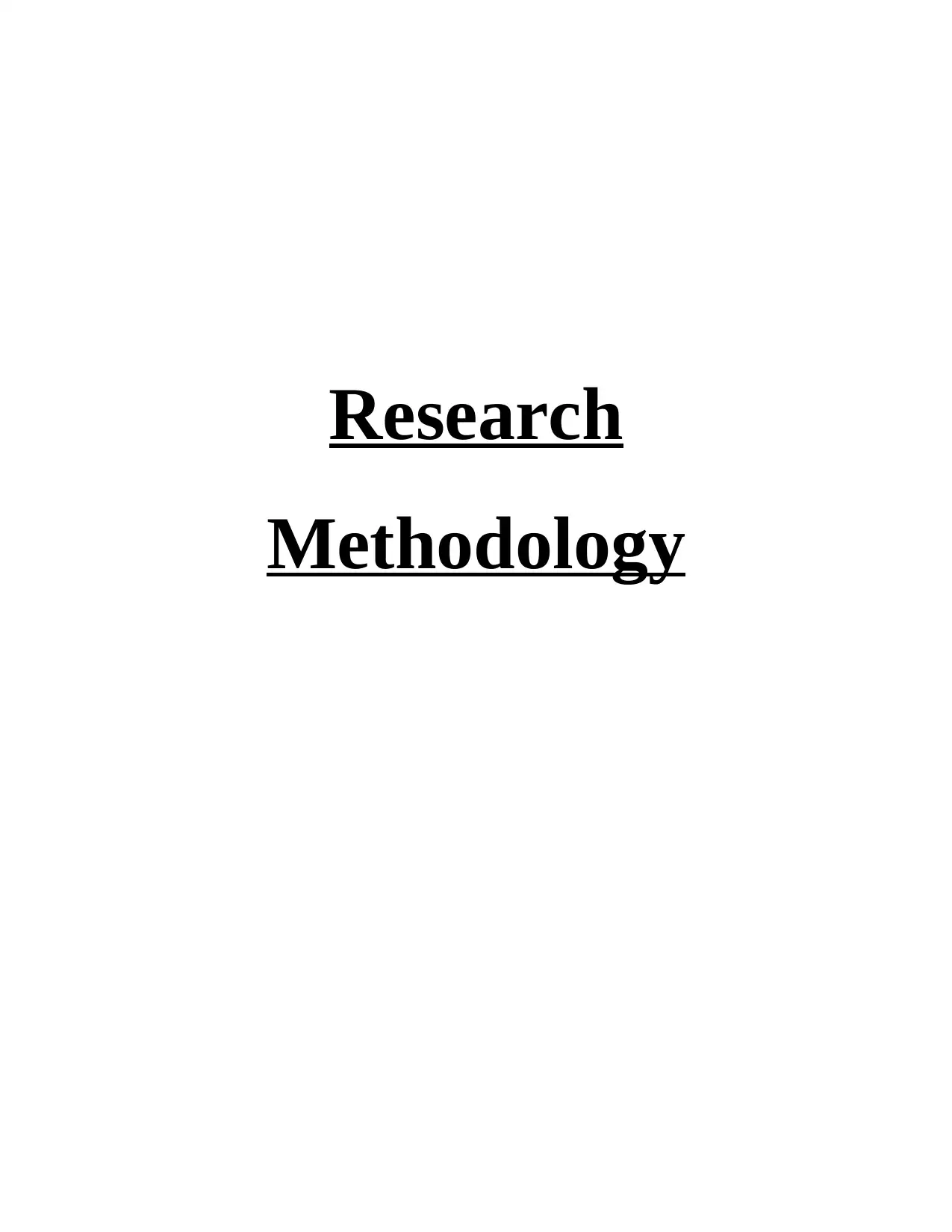
Research
Methodology
Methodology
Paraphrase This Document
Need a fresh take? Get an instant paraphrase of this document with our AI Paraphraser
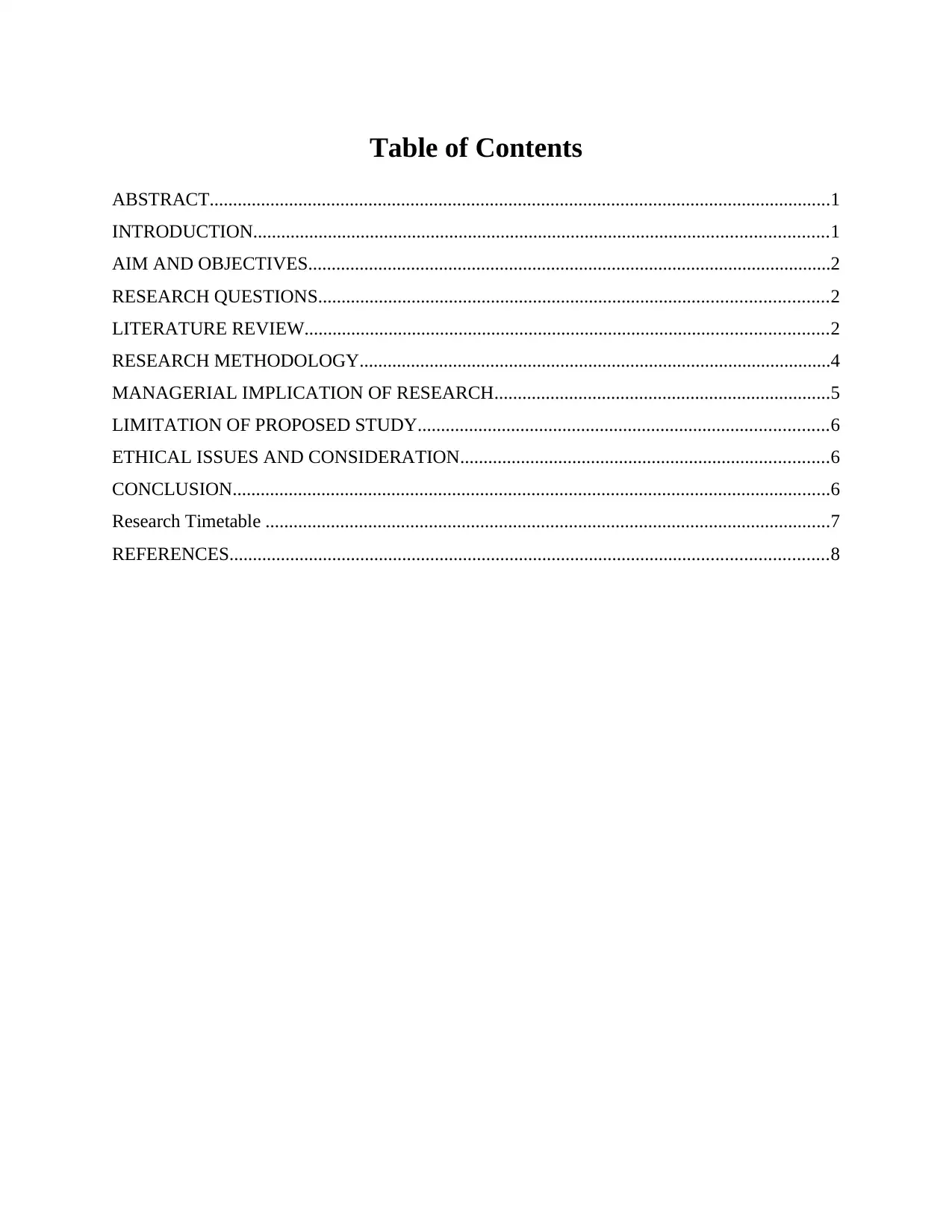
Table of Contents
ABSTRACT.....................................................................................................................................1
INTRODUCTION...........................................................................................................................1
AIM AND OBJECTIVES................................................................................................................2
RESEARCH QUESTIONS.............................................................................................................2
LITERATURE REVIEW................................................................................................................2
RESEARCH METHODOLOGY.....................................................................................................4
MANAGERIAL IMPLICATION OF RESEARCH........................................................................5
LIMITATION OF PROPOSED STUDY........................................................................................6
ETHICAL ISSUES AND CONSIDERATION...............................................................................6
CONCLUSION................................................................................................................................6
Research Timetable .........................................................................................................................7
REFERENCES................................................................................................................................8
ABSTRACT.....................................................................................................................................1
INTRODUCTION...........................................................................................................................1
AIM AND OBJECTIVES................................................................................................................2
RESEARCH QUESTIONS.............................................................................................................2
LITERATURE REVIEW................................................................................................................2
RESEARCH METHODOLOGY.....................................................................................................4
MANAGERIAL IMPLICATION OF RESEARCH........................................................................5
LIMITATION OF PROPOSED STUDY........................................................................................6
ETHICAL ISSUES AND CONSIDERATION...............................................................................6
CONCLUSION................................................................................................................................6
Research Timetable .........................................................................................................................7
REFERENCES................................................................................................................................8
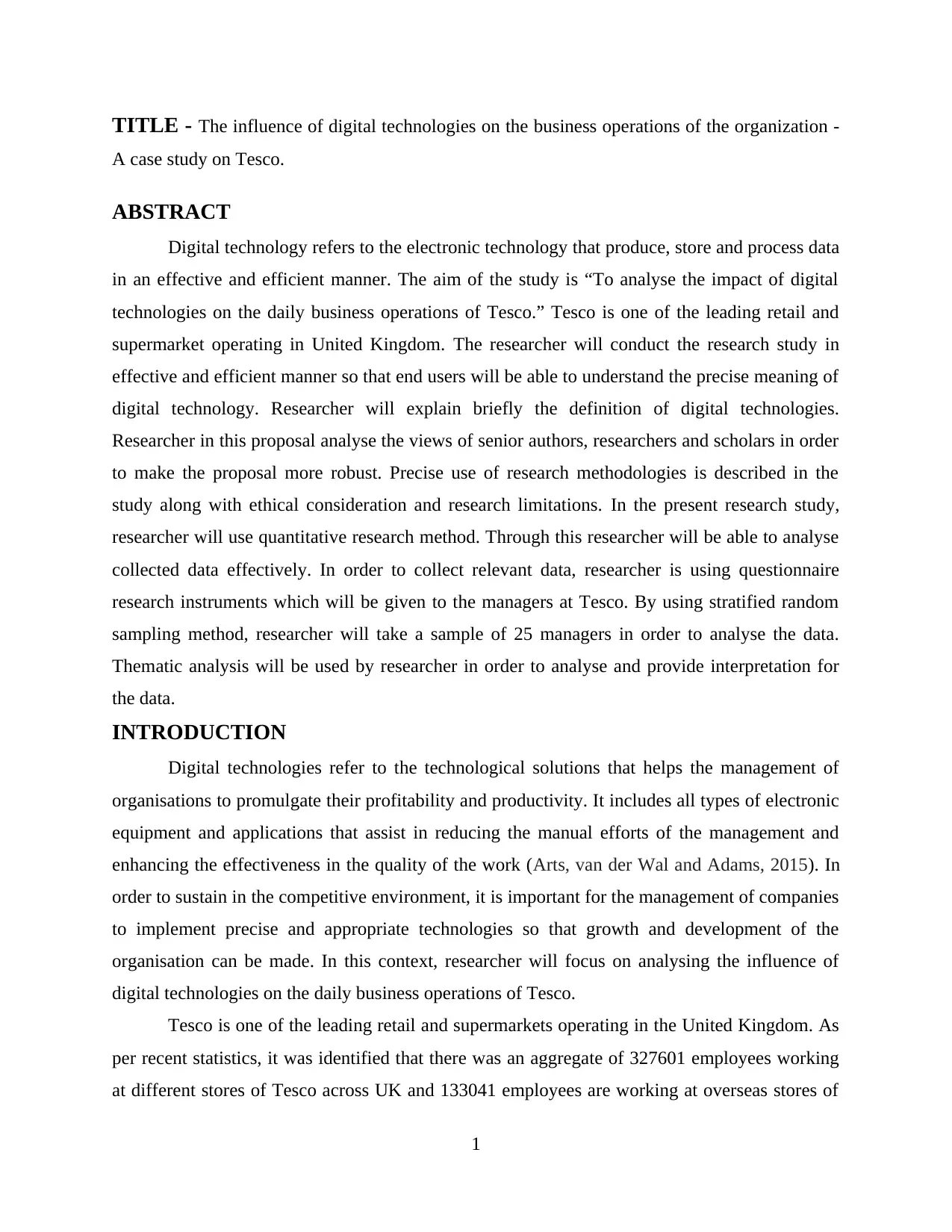
TITLE - The influence of digital technologies on the business operations of the organization -
A case study on Tesco.
ABSTRACT
Digital technology refers to the electronic technology that produce, store and process data
in an effective and efficient manner. The aim of the study is “To analyse the impact of digital
technologies on the daily business operations of Tesco.” Tesco is one of the leading retail and
supermarket operating in United Kingdom. The researcher will conduct the research study in
effective and efficient manner so that end users will be able to understand the precise meaning of
digital technology. Researcher will explain briefly the definition of digital technologies.
Researcher in this proposal analyse the views of senior authors, researchers and scholars in order
to make the proposal more robust. Precise use of research methodologies is described in the
study along with ethical consideration and research limitations. In the present research study,
researcher will use quantitative research method. Through this researcher will be able to analyse
collected data effectively. In order to collect relevant data, researcher is using questionnaire
research instruments which will be given to the managers at Tesco. By using stratified random
sampling method, researcher will take a sample of 25 managers in order to analyse the data.
Thematic analysis will be used by researcher in order to analyse and provide interpretation for
the data.
INTRODUCTION
Digital technologies refer to the technological solutions that helps the management of
organisations to promulgate their profitability and productivity. It includes all types of electronic
equipment and applications that assist in reducing the manual efforts of the management and
enhancing the effectiveness in the quality of the work (Arts, van der Wal and Adams, 2015). In
order to sustain in the competitive environment, it is important for the management of companies
to implement precise and appropriate technologies so that growth and development of the
organisation can be made. In this context, researcher will focus on analysing the influence of
digital technologies on the daily business operations of Tesco.
Tesco is one of the leading retail and supermarkets operating in the United Kingdom. As
per recent statistics, it was identified that there was an aggregate of 327601 employees working
at different stores of Tesco across UK and 133041 employees are working at overseas stores of
1
A case study on Tesco.
ABSTRACT
Digital technology refers to the electronic technology that produce, store and process data
in an effective and efficient manner. The aim of the study is “To analyse the impact of digital
technologies on the daily business operations of Tesco.” Tesco is one of the leading retail and
supermarket operating in United Kingdom. The researcher will conduct the research study in
effective and efficient manner so that end users will be able to understand the precise meaning of
digital technology. Researcher will explain briefly the definition of digital technologies.
Researcher in this proposal analyse the views of senior authors, researchers and scholars in order
to make the proposal more robust. Precise use of research methodologies is described in the
study along with ethical consideration and research limitations. In the present research study,
researcher will use quantitative research method. Through this researcher will be able to analyse
collected data effectively. In order to collect relevant data, researcher is using questionnaire
research instruments which will be given to the managers at Tesco. By using stratified random
sampling method, researcher will take a sample of 25 managers in order to analyse the data.
Thematic analysis will be used by researcher in order to analyse and provide interpretation for
the data.
INTRODUCTION
Digital technologies refer to the technological solutions that helps the management of
organisations to promulgate their profitability and productivity. It includes all types of electronic
equipment and applications that assist in reducing the manual efforts of the management and
enhancing the effectiveness in the quality of the work (Arts, van der Wal and Adams, 2015). In
order to sustain in the competitive environment, it is important for the management of companies
to implement precise and appropriate technologies so that growth and development of the
organisation can be made. In this context, researcher will focus on analysing the influence of
digital technologies on the daily business operations of Tesco.
Tesco is one of the leading retail and supermarkets operating in the United Kingdom. As
per recent statistics, it was identified that there was an aggregate of 327601 employees working
at different stores of Tesco across UK and 133041 employees are working at overseas stores of
1
⊘ This is a preview!⊘
Do you want full access?
Subscribe today to unlock all pages.

Trusted by 1+ million students worldwide
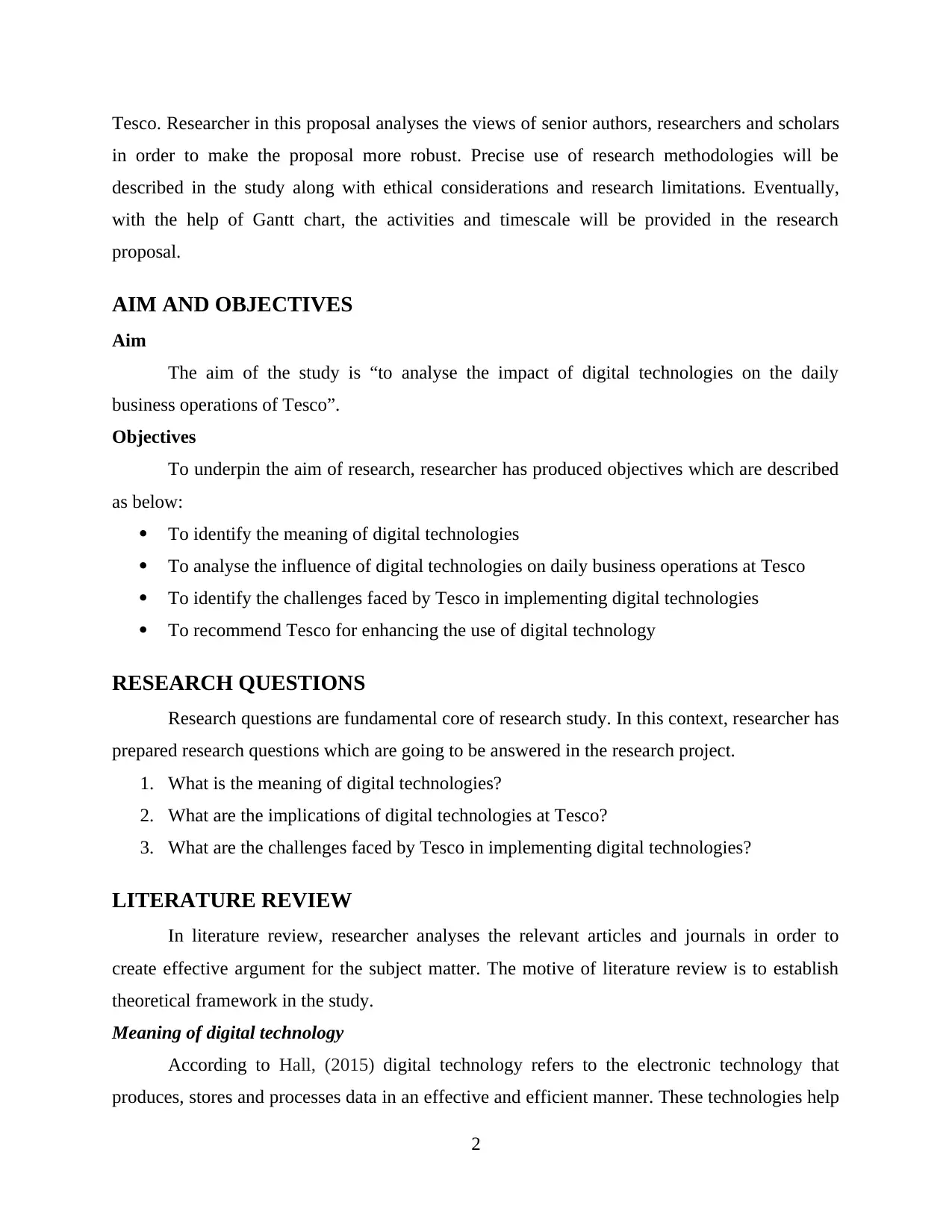
Tesco. Researcher in this proposal analyses the views of senior authors, researchers and scholars
in order to make the proposal more robust. Precise use of research methodologies will be
described in the study along with ethical considerations and research limitations. Eventually,
with the help of Gantt chart, the activities and timescale will be provided in the research
proposal.
AIM AND OBJECTIVES
Aim
The aim of the study is “to analyse the impact of digital technologies on the daily
business operations of Tesco”.
Objectives
To underpin the aim of research, researcher has produced objectives which are described
as below:
To identify the meaning of digital technologies
To analyse the influence of digital technologies on daily business operations at Tesco
To identify the challenges faced by Tesco in implementing digital technologies
To recommend Tesco for enhancing the use of digital technology
RESEARCH QUESTIONS
Research questions are fundamental core of research study. In this context, researcher has
prepared research questions which are going to be answered in the research project.
1. What is the meaning of digital technologies?
2. What are the implications of digital technologies at Tesco?
3. What are the challenges faced by Tesco in implementing digital technologies?
LITERATURE REVIEW
In literature review, researcher analyses the relevant articles and journals in order to
create effective argument for the subject matter. The motive of literature review is to establish
theoretical framework in the study.
Meaning of digital technology
According to Hall, (2015) digital technology refers to the electronic technology that
produces, stores and processes data in an effective and efficient manner. These technologies help
2
in order to make the proposal more robust. Precise use of research methodologies will be
described in the study along with ethical considerations and research limitations. Eventually,
with the help of Gantt chart, the activities and timescale will be provided in the research
proposal.
AIM AND OBJECTIVES
Aim
The aim of the study is “to analyse the impact of digital technologies on the daily
business operations of Tesco”.
Objectives
To underpin the aim of research, researcher has produced objectives which are described
as below:
To identify the meaning of digital technologies
To analyse the influence of digital technologies on daily business operations at Tesco
To identify the challenges faced by Tesco in implementing digital technologies
To recommend Tesco for enhancing the use of digital technology
RESEARCH QUESTIONS
Research questions are fundamental core of research study. In this context, researcher has
prepared research questions which are going to be answered in the research project.
1. What is the meaning of digital technologies?
2. What are the implications of digital technologies at Tesco?
3. What are the challenges faced by Tesco in implementing digital technologies?
LITERATURE REVIEW
In literature review, researcher analyses the relevant articles and journals in order to
create effective argument for the subject matter. The motive of literature review is to establish
theoretical framework in the study.
Meaning of digital technology
According to Hall, (2015) digital technology refers to the electronic technology that
produces, stores and processes data in an effective and efficient manner. These technologies help
2
Paraphrase This Document
Need a fresh take? Get an instant paraphrase of this document with our AI Paraphraser
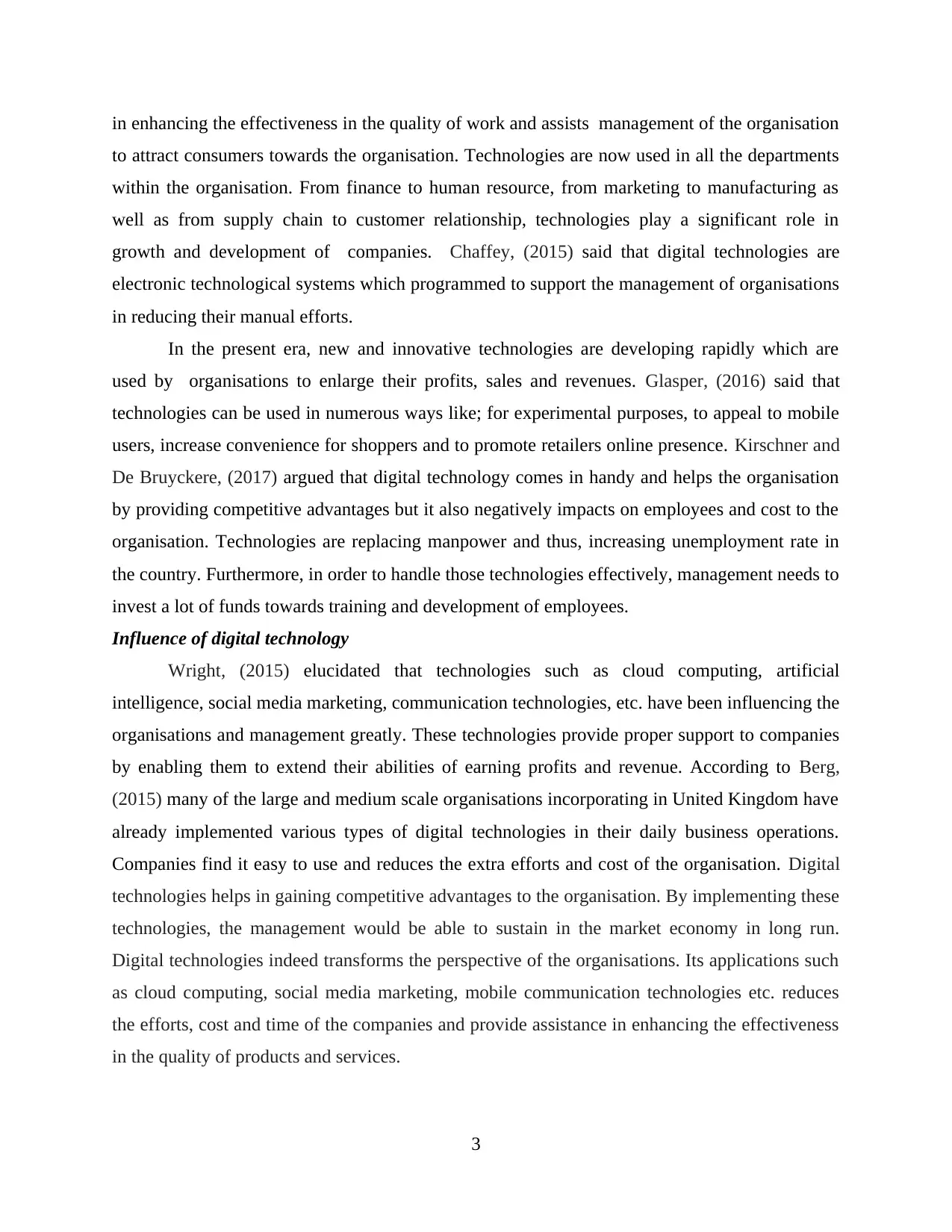
in enhancing the effectiveness in the quality of work and assists management of the organisation
to attract consumers towards the organisation. Technologies are now used in all the departments
within the organisation. From finance to human resource, from marketing to manufacturing as
well as from supply chain to customer relationship, technologies play a significant role in
growth and development of companies. Chaffey, (2015) said that digital technologies are
electronic technological systems which programmed to support the management of organisations
in reducing their manual efforts.
In the present era, new and innovative technologies are developing rapidly which are
used by organisations to enlarge their profits, sales and revenues. Glasper, (2016) said that
technologies can be used in numerous ways like; for experimental purposes, to appeal to mobile
users, increase convenience for shoppers and to promote retailers online presence. Kirschner and
De Bruyckere, (2017) argued that digital technology comes in handy and helps the organisation
by providing competitive advantages but it also negatively impacts on employees and cost to the
organisation. Technologies are replacing manpower and thus, increasing unemployment rate in
the country. Furthermore, in order to handle those technologies effectively, management needs to
invest a lot of funds towards training and development of employees.
Influence of digital technology
Wright, (2015) elucidated that technologies such as cloud computing, artificial
intelligence, social media marketing, communication technologies, etc. have been influencing the
organisations and management greatly. These technologies provide proper support to companies
by enabling them to extend their abilities of earning profits and revenue. According to Berg,
(2015) many of the large and medium scale organisations incorporating in United Kingdom have
already implemented various types of digital technologies in their daily business operations.
Companies find it easy to use and reduces the extra efforts and cost of the organisation. Digital
technologies helps in gaining competitive advantages to the organisation. By implementing these
technologies, the management would be able to sustain in the market economy in long run.
Digital technologies indeed transforms the perspective of the organisations. Its applications such
as cloud computing, social media marketing, mobile communication technologies etc. reduces
the efforts, cost and time of the companies and provide assistance in enhancing the effectiveness
in the quality of products and services.
3
to attract consumers towards the organisation. Technologies are now used in all the departments
within the organisation. From finance to human resource, from marketing to manufacturing as
well as from supply chain to customer relationship, technologies play a significant role in
growth and development of companies. Chaffey, (2015) said that digital technologies are
electronic technological systems which programmed to support the management of organisations
in reducing their manual efforts.
In the present era, new and innovative technologies are developing rapidly which are
used by organisations to enlarge their profits, sales and revenues. Glasper, (2016) said that
technologies can be used in numerous ways like; for experimental purposes, to appeal to mobile
users, increase convenience for shoppers and to promote retailers online presence. Kirschner and
De Bruyckere, (2017) argued that digital technology comes in handy and helps the organisation
by providing competitive advantages but it also negatively impacts on employees and cost to the
organisation. Technologies are replacing manpower and thus, increasing unemployment rate in
the country. Furthermore, in order to handle those technologies effectively, management needs to
invest a lot of funds towards training and development of employees.
Influence of digital technology
Wright, (2015) elucidated that technologies such as cloud computing, artificial
intelligence, social media marketing, communication technologies, etc. have been influencing the
organisations and management greatly. These technologies provide proper support to companies
by enabling them to extend their abilities of earning profits and revenue. According to Berg,
(2015) many of the large and medium scale organisations incorporating in United Kingdom have
already implemented various types of digital technologies in their daily business operations.
Companies find it easy to use and reduces the extra efforts and cost of the organisation. Digital
technologies helps in gaining competitive advantages to the organisation. By implementing these
technologies, the management would be able to sustain in the market economy in long run.
Digital technologies indeed transforms the perspective of the organisations. Its applications such
as cloud computing, social media marketing, mobile communication technologies etc. reduces
the efforts, cost and time of the companies and provide assistance in enhancing the effectiveness
in the quality of products and services.
3
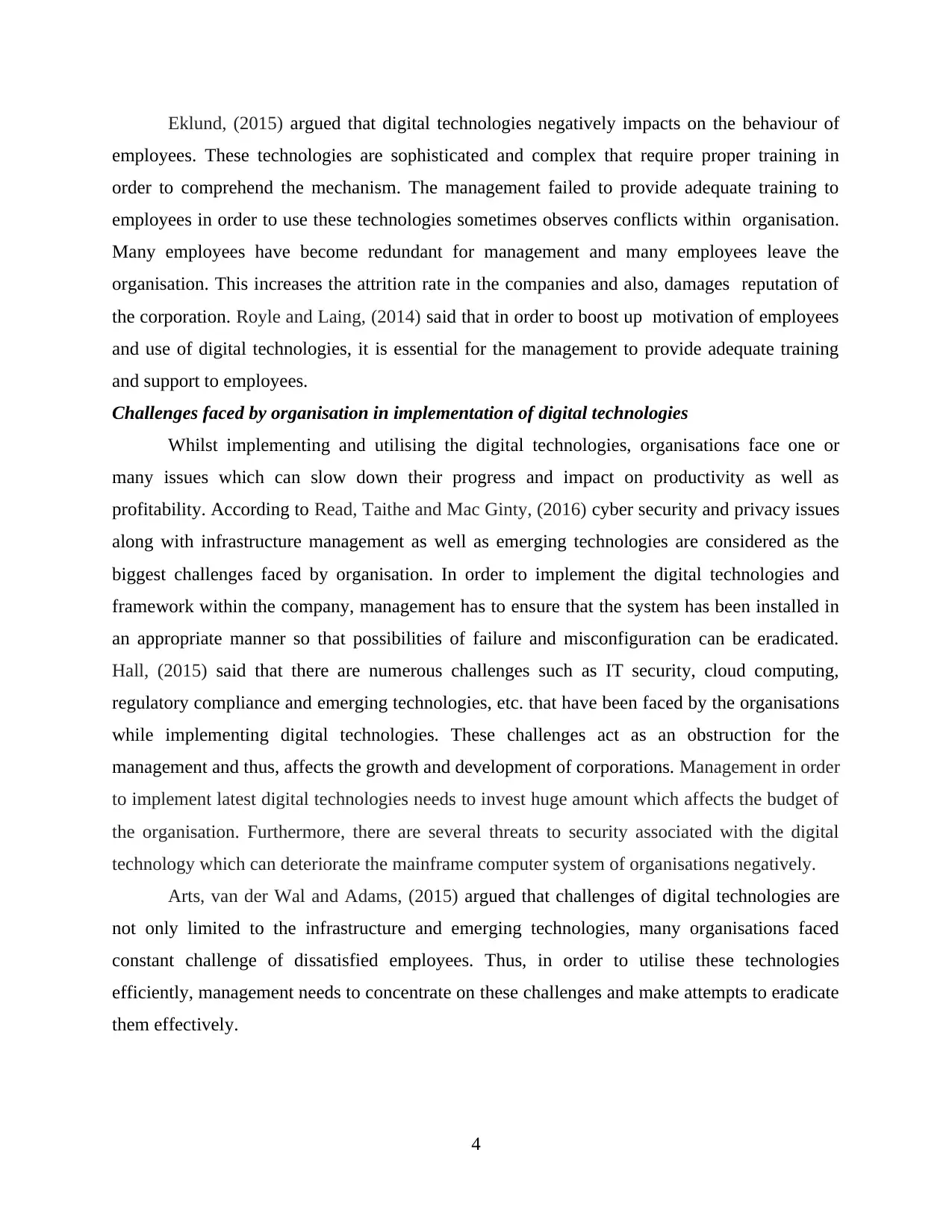
Eklund, (2015) argued that digital technologies negatively impacts on the behaviour of
employees. These technologies are sophisticated and complex that require proper training in
order to comprehend the mechanism. The management failed to provide adequate training to
employees in order to use these technologies sometimes observes conflicts within organisation.
Many employees have become redundant for management and many employees leave the
organisation. This increases the attrition rate in the companies and also, damages reputation of
the corporation. Royle and Laing, (2014) said that in order to boost up motivation of employees
and use of digital technologies, it is essential for the management to provide adequate training
and support to employees.
Challenges faced by organisation in implementation of digital technologies
Whilst implementing and utilising the digital technologies, organisations face one or
many issues which can slow down their progress and impact on productivity as well as
profitability. According to Read, Taithe and Mac Ginty, (2016) cyber security and privacy issues
along with infrastructure management as well as emerging technologies are considered as the
biggest challenges faced by organisation. In order to implement the digital technologies and
framework within the company, management has to ensure that the system has been installed in
an appropriate manner so that possibilities of failure and misconfiguration can be eradicated.
Hall, (2015) said that there are numerous challenges such as IT security, cloud computing,
regulatory compliance and emerging technologies, etc. that have been faced by the organisations
while implementing digital technologies. These challenges act as an obstruction for the
management and thus, affects the growth and development of corporations. Management in order
to implement latest digital technologies needs to invest huge amount which affects the budget of
the organisation. Furthermore, there are several threats to security associated with the digital
technology which can deteriorate the mainframe computer system of organisations negatively.
Arts, van der Wal and Adams, (2015) argued that challenges of digital technologies are
not only limited to the infrastructure and emerging technologies, many organisations faced
constant challenge of dissatisfied employees. Thus, in order to utilise these technologies
efficiently, management needs to concentrate on these challenges and make attempts to eradicate
them effectively.
4
employees. These technologies are sophisticated and complex that require proper training in
order to comprehend the mechanism. The management failed to provide adequate training to
employees in order to use these technologies sometimes observes conflicts within organisation.
Many employees have become redundant for management and many employees leave the
organisation. This increases the attrition rate in the companies and also, damages reputation of
the corporation. Royle and Laing, (2014) said that in order to boost up motivation of employees
and use of digital technologies, it is essential for the management to provide adequate training
and support to employees.
Challenges faced by organisation in implementation of digital technologies
Whilst implementing and utilising the digital technologies, organisations face one or
many issues which can slow down their progress and impact on productivity as well as
profitability. According to Read, Taithe and Mac Ginty, (2016) cyber security and privacy issues
along with infrastructure management as well as emerging technologies are considered as the
biggest challenges faced by organisation. In order to implement the digital technologies and
framework within the company, management has to ensure that the system has been installed in
an appropriate manner so that possibilities of failure and misconfiguration can be eradicated.
Hall, (2015) said that there are numerous challenges such as IT security, cloud computing,
regulatory compliance and emerging technologies, etc. that have been faced by the organisations
while implementing digital technologies. These challenges act as an obstruction for the
management and thus, affects the growth and development of corporations. Management in order
to implement latest digital technologies needs to invest huge amount which affects the budget of
the organisation. Furthermore, there are several threats to security associated with the digital
technology which can deteriorate the mainframe computer system of organisations negatively.
Arts, van der Wal and Adams, (2015) argued that challenges of digital technologies are
not only limited to the infrastructure and emerging technologies, many organisations faced
constant challenge of dissatisfied employees. Thus, in order to utilise these technologies
efficiently, management needs to concentrate on these challenges and make attempts to eradicate
them effectively.
4
⊘ This is a preview!⊘
Do you want full access?
Subscribe today to unlock all pages.

Trusted by 1+ million students worldwide
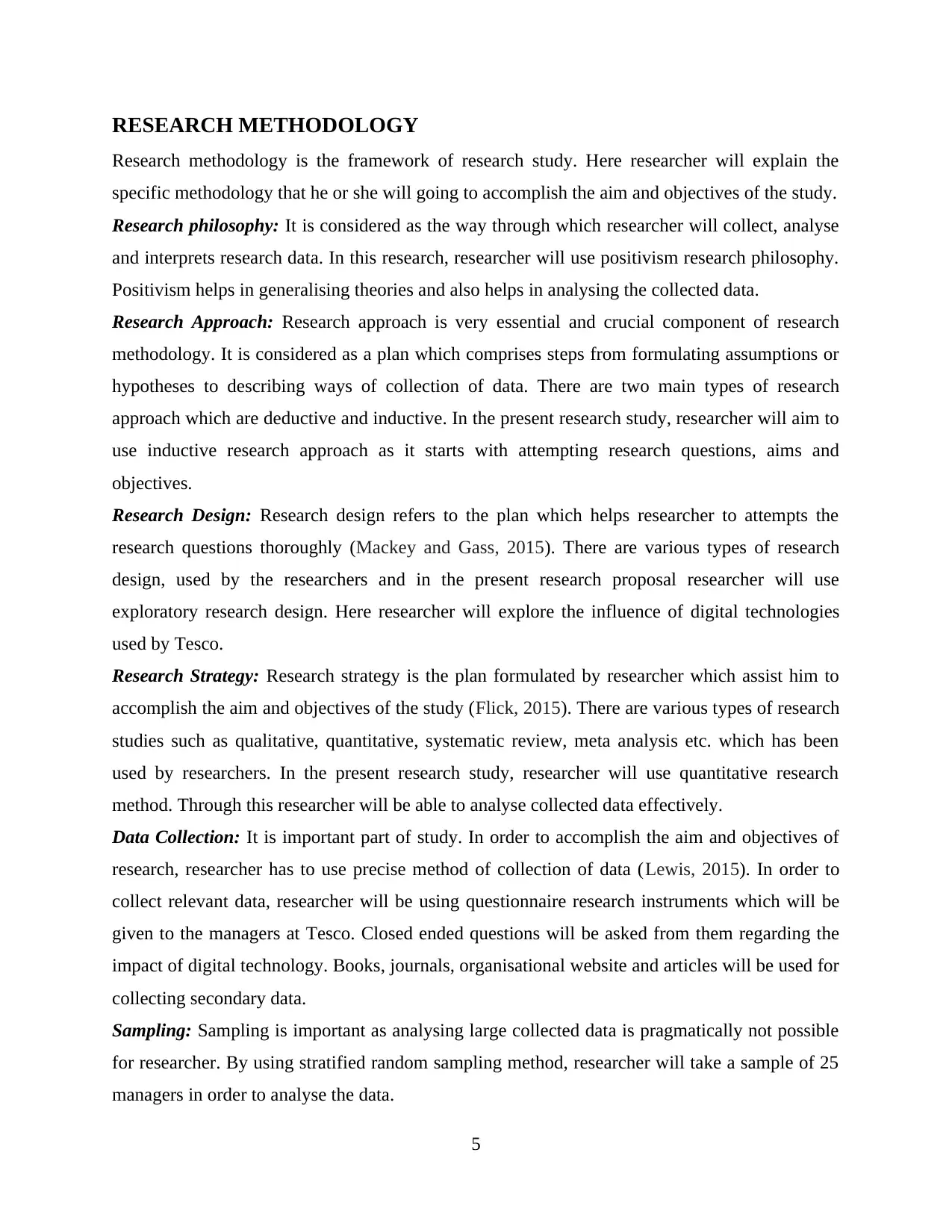
RESEARCH METHODOLOGY
Research methodology is the framework of research study. Here researcher will explain the
specific methodology that he or she will going to accomplish the aim and objectives of the study.
Research philosophy: It is considered as the way through which researcher will collect, analyse
and interprets research data. In this research, researcher will use positivism research philosophy.
Positivism helps in generalising theories and also helps in analysing the collected data.
Research Approach: Research approach is very essential and crucial component of research
methodology. It is considered as a plan which comprises steps from formulating assumptions or
hypotheses to describing ways of collection of data. There are two main types of research
approach which are deductive and inductive. In the present research study, researcher will aim to
use inductive research approach as it starts with attempting research questions, aims and
objectives.
Research Design: Research design refers to the plan which helps researcher to attempts the
research questions thoroughly (Mackey and Gass, 2015). There are various types of research
design, used by the researchers and in the present research proposal researcher will use
exploratory research design. Here researcher will explore the influence of digital technologies
used by Tesco.
Research Strategy: Research strategy is the plan formulated by researcher which assist him to
accomplish the aim and objectives of the study (Flick, 2015). There are various types of research
studies such as qualitative, quantitative, systematic review, meta analysis etc. which has been
used by researchers. In the present research study, researcher will use quantitative research
method. Through this researcher will be able to analyse collected data effectively.
Data Collection: It is important part of study. In order to accomplish the aim and objectives of
research, researcher has to use precise method of collection of data (Lewis, 2015). In order to
collect relevant data, researcher will be using questionnaire research instruments which will be
given to the managers at Tesco. Closed ended questions will be asked from them regarding the
impact of digital technology. Books, journals, organisational website and articles will be used for
collecting secondary data.
Sampling: Sampling is important as analysing large collected data is pragmatically not possible
for researcher. By using stratified random sampling method, researcher will take a sample of 25
managers in order to analyse the data.
5
Research methodology is the framework of research study. Here researcher will explain the
specific methodology that he or she will going to accomplish the aim and objectives of the study.
Research philosophy: It is considered as the way through which researcher will collect, analyse
and interprets research data. In this research, researcher will use positivism research philosophy.
Positivism helps in generalising theories and also helps in analysing the collected data.
Research Approach: Research approach is very essential and crucial component of research
methodology. It is considered as a plan which comprises steps from formulating assumptions or
hypotheses to describing ways of collection of data. There are two main types of research
approach which are deductive and inductive. In the present research study, researcher will aim to
use inductive research approach as it starts with attempting research questions, aims and
objectives.
Research Design: Research design refers to the plan which helps researcher to attempts the
research questions thoroughly (Mackey and Gass, 2015). There are various types of research
design, used by the researchers and in the present research proposal researcher will use
exploratory research design. Here researcher will explore the influence of digital technologies
used by Tesco.
Research Strategy: Research strategy is the plan formulated by researcher which assist him to
accomplish the aim and objectives of the study (Flick, 2015). There are various types of research
studies such as qualitative, quantitative, systematic review, meta analysis etc. which has been
used by researchers. In the present research study, researcher will use quantitative research
method. Through this researcher will be able to analyse collected data effectively.
Data Collection: It is important part of study. In order to accomplish the aim and objectives of
research, researcher has to use precise method of collection of data (Lewis, 2015). In order to
collect relevant data, researcher will be using questionnaire research instruments which will be
given to the managers at Tesco. Closed ended questions will be asked from them regarding the
impact of digital technology. Books, journals, organisational website and articles will be used for
collecting secondary data.
Sampling: Sampling is important as analysing large collected data is pragmatically not possible
for researcher. By using stratified random sampling method, researcher will take a sample of 25
managers in order to analyse the data.
5
Paraphrase This Document
Need a fresh take? Get an instant paraphrase of this document with our AI Paraphraser
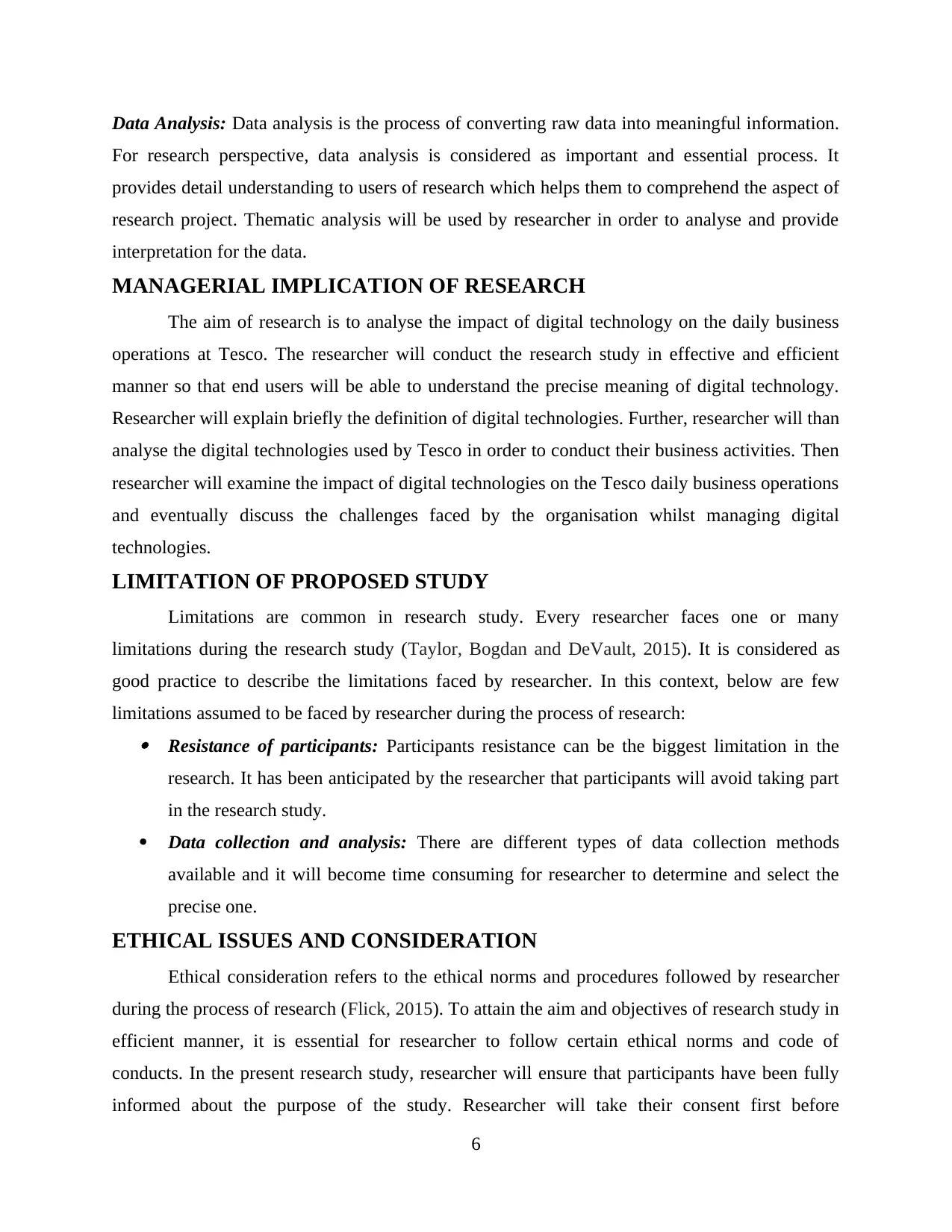
Data Analysis: Data analysis is the process of converting raw data into meaningful information.
For research perspective, data analysis is considered as important and essential process. It
provides detail understanding to users of research which helps them to comprehend the aspect of
research project. Thematic analysis will be used by researcher in order to analyse and provide
interpretation for the data.
MANAGERIAL IMPLICATION OF RESEARCH
The aim of research is to analyse the impact of digital technology on the daily business
operations at Tesco. The researcher will conduct the research study in effective and efficient
manner so that end users will be able to understand the precise meaning of digital technology.
Researcher will explain briefly the definition of digital technologies. Further, researcher will than
analyse the digital technologies used by Tesco in order to conduct their business activities. Then
researcher will examine the impact of digital technologies on the Tesco daily business operations
and eventually discuss the challenges faced by the organisation whilst managing digital
technologies.
LIMITATION OF PROPOSED STUDY
Limitations are common in research study. Every researcher faces one or many
limitations during the research study (Taylor, Bogdan and DeVault, 2015). It is considered as
good practice to describe the limitations faced by researcher. In this context, below are few
limitations assumed to be faced by researcher during the process of research: Resistance of participants: Participants resistance can be the biggest limitation in the
research. It has been anticipated by the researcher that participants will avoid taking part
in the research study.
Data collection and analysis: There are different types of data collection methods
available and it will become time consuming for researcher to determine and select the
precise one.
ETHICAL ISSUES AND CONSIDERATION
Ethical consideration refers to the ethical norms and procedures followed by researcher
during the process of research (Flick, 2015). To attain the aim and objectives of research study in
efficient manner, it is essential for researcher to follow certain ethical norms and code of
conducts. In the present research study, researcher will ensure that participants have been fully
informed about the purpose of the study. Researcher will take their consent first before
6
For research perspective, data analysis is considered as important and essential process. It
provides detail understanding to users of research which helps them to comprehend the aspect of
research project. Thematic analysis will be used by researcher in order to analyse and provide
interpretation for the data.
MANAGERIAL IMPLICATION OF RESEARCH
The aim of research is to analyse the impact of digital technology on the daily business
operations at Tesco. The researcher will conduct the research study in effective and efficient
manner so that end users will be able to understand the precise meaning of digital technology.
Researcher will explain briefly the definition of digital technologies. Further, researcher will than
analyse the digital technologies used by Tesco in order to conduct their business activities. Then
researcher will examine the impact of digital technologies on the Tesco daily business operations
and eventually discuss the challenges faced by the organisation whilst managing digital
technologies.
LIMITATION OF PROPOSED STUDY
Limitations are common in research study. Every researcher faces one or many
limitations during the research study (Taylor, Bogdan and DeVault, 2015). It is considered as
good practice to describe the limitations faced by researcher. In this context, below are few
limitations assumed to be faced by researcher during the process of research: Resistance of participants: Participants resistance can be the biggest limitation in the
research. It has been anticipated by the researcher that participants will avoid taking part
in the research study.
Data collection and analysis: There are different types of data collection methods
available and it will become time consuming for researcher to determine and select the
precise one.
ETHICAL ISSUES AND CONSIDERATION
Ethical consideration refers to the ethical norms and procedures followed by researcher
during the process of research (Flick, 2015). To attain the aim and objectives of research study in
efficient manner, it is essential for researcher to follow certain ethical norms and code of
conducts. In the present research study, researcher will ensure that participants have been fully
informed about the purpose of the study. Researcher will take their consent first before
6
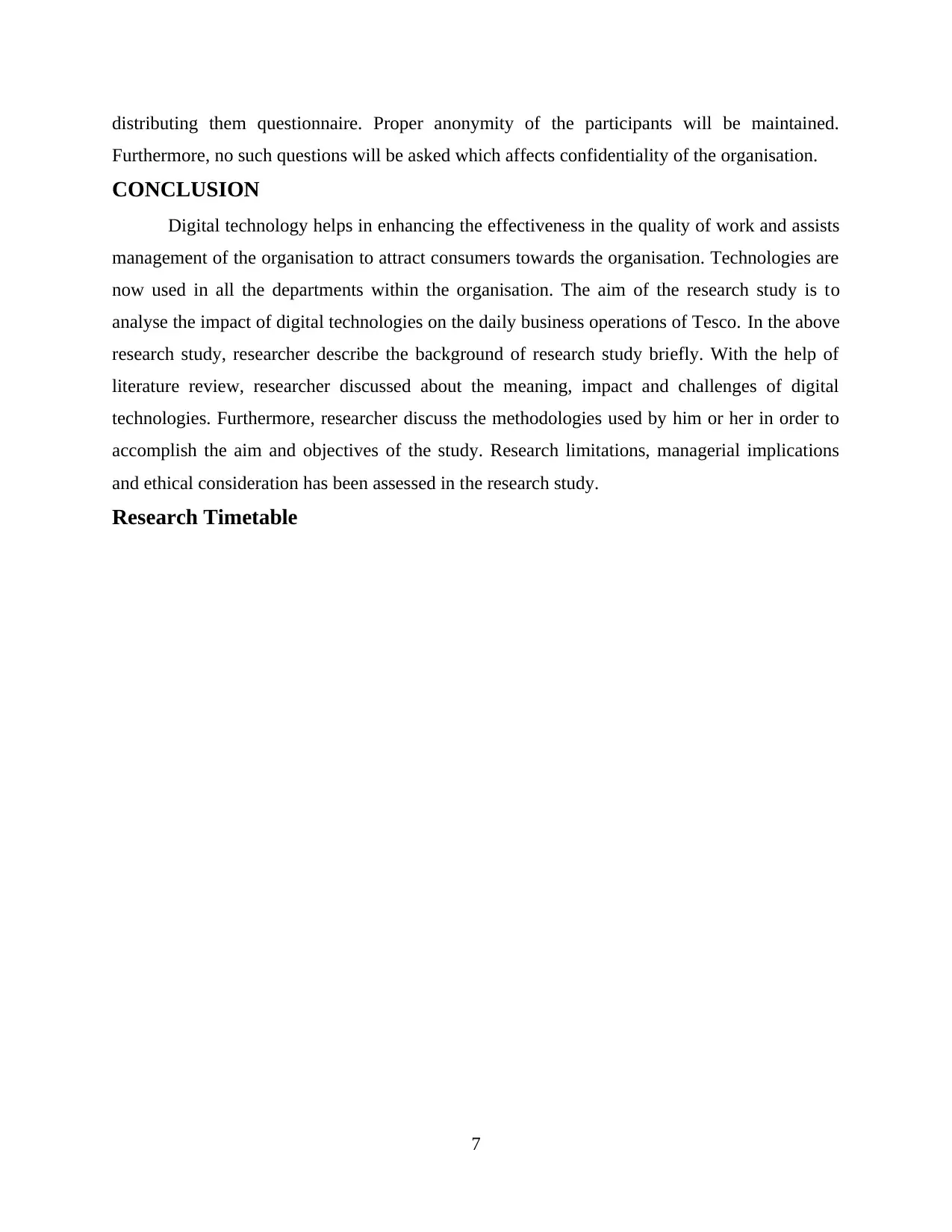
distributing them questionnaire. Proper anonymity of the participants will be maintained.
Furthermore, no such questions will be asked which affects confidentiality of the organisation.
CONCLUSION
Digital technology helps in enhancing the effectiveness in the quality of work and assists
management of the organisation to attract consumers towards the organisation. Technologies are
now used in all the departments within the organisation. The aim of the research study is to
analyse the impact of digital technologies on the daily business operations of Tesco. In the above
research study, researcher describe the background of research study briefly. With the help of
literature review, researcher discussed about the meaning, impact and challenges of digital
technologies. Furthermore, researcher discuss the methodologies used by him or her in order to
accomplish the aim and objectives of the study. Research limitations, managerial implications
and ethical consideration has been assessed in the research study.
Research Timetable
7
Furthermore, no such questions will be asked which affects confidentiality of the organisation.
CONCLUSION
Digital technology helps in enhancing the effectiveness in the quality of work and assists
management of the organisation to attract consumers towards the organisation. Technologies are
now used in all the departments within the organisation. The aim of the research study is to
analyse the impact of digital technologies on the daily business operations of Tesco. In the above
research study, researcher describe the background of research study briefly. With the help of
literature review, researcher discussed about the meaning, impact and challenges of digital
technologies. Furthermore, researcher discuss the methodologies used by him or her in order to
accomplish the aim and objectives of the study. Research limitations, managerial implications
and ethical consideration has been assessed in the research study.
Research Timetable
7
⊘ This is a preview!⊘
Do you want full access?
Subscribe today to unlock all pages.

Trusted by 1+ million students worldwide
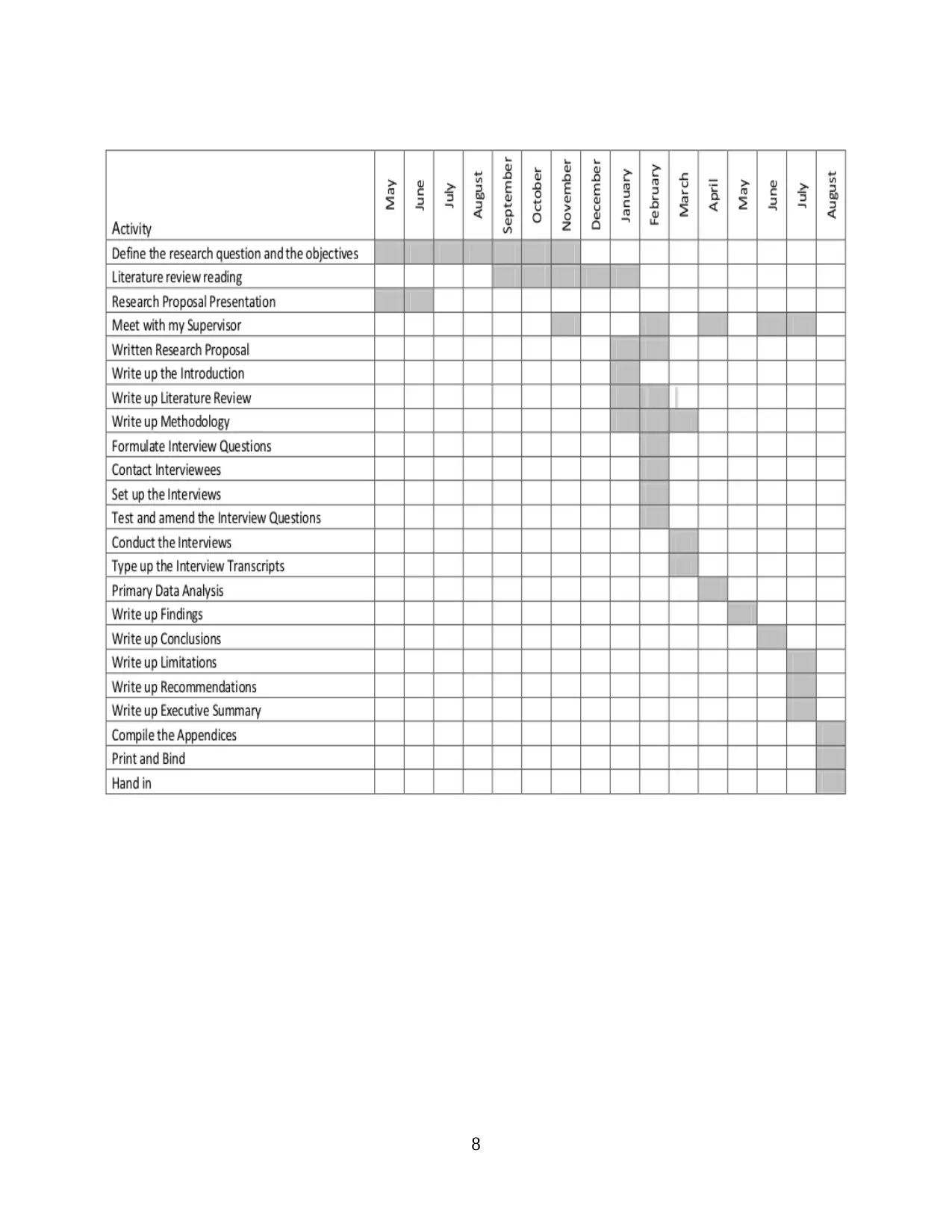
8
Paraphrase This Document
Need a fresh take? Get an instant paraphrase of this document with our AI Paraphraser
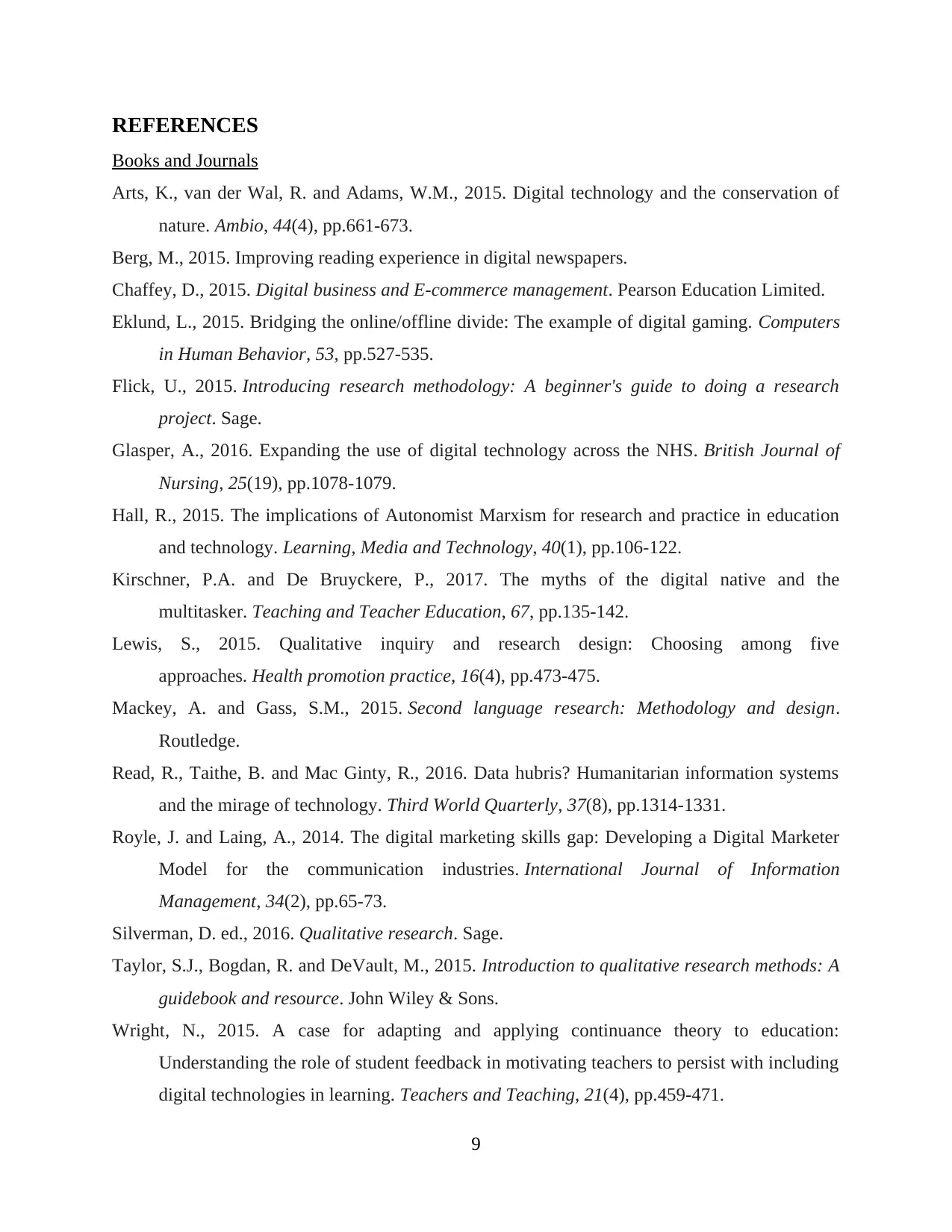
REFERENCES
Books and Journals
Arts, K., van der Wal, R. and Adams, W.M., 2015. Digital technology and the conservation of
nature. Ambio, 44(4), pp.661-673.
Berg, M., 2015. Improving reading experience in digital newspapers.
Chaffey, D., 2015. Digital business and E-commerce management. Pearson Education Limited.
Eklund, L., 2015. Bridging the online/offline divide: The example of digital gaming. Computers
in Human Behavior, 53, pp.527-535.
Flick, U., 2015. Introducing research methodology: A beginner's guide to doing a research
project. Sage.
Glasper, A., 2016. Expanding the use of digital technology across the NHS. British Journal of
Nursing, 25(19), pp.1078-1079.
Hall, R., 2015. The implications of Autonomist Marxism for research and practice in education
and technology. Learning, Media and Technology, 40(1), pp.106-122.
Kirschner, P.A. and De Bruyckere, P., 2017. The myths of the digital native and the
multitasker. Teaching and Teacher Education, 67, pp.135-142.
Lewis, S., 2015. Qualitative inquiry and research design: Choosing among five
approaches. Health promotion practice, 16(4), pp.473-475.
Mackey, A. and Gass, S.M., 2015. Second language research: Methodology and design.
Routledge.
Read, R., Taithe, B. and Mac Ginty, R., 2016. Data hubris? Humanitarian information systems
and the mirage of technology. Third World Quarterly, 37(8), pp.1314-1331.
Royle, J. and Laing, A., 2014. The digital marketing skills gap: Developing a Digital Marketer
Model for the communication industries. International Journal of Information
Management, 34(2), pp.65-73.
Silverman, D. ed., 2016. Qualitative research. Sage.
Taylor, S.J., Bogdan, R. and DeVault, M., 2015. Introduction to qualitative research methods: A
guidebook and resource. John Wiley & Sons.
Wright, N., 2015. A case for adapting and applying continuance theory to education:
Understanding the role of student feedback in motivating teachers to persist with including
digital technologies in learning. Teachers and Teaching, 21(4), pp.459-471.
9
Books and Journals
Arts, K., van der Wal, R. and Adams, W.M., 2015. Digital technology and the conservation of
nature. Ambio, 44(4), pp.661-673.
Berg, M., 2015. Improving reading experience in digital newspapers.
Chaffey, D., 2015. Digital business and E-commerce management. Pearson Education Limited.
Eklund, L., 2015. Bridging the online/offline divide: The example of digital gaming. Computers
in Human Behavior, 53, pp.527-535.
Flick, U., 2015. Introducing research methodology: A beginner's guide to doing a research
project. Sage.
Glasper, A., 2016. Expanding the use of digital technology across the NHS. British Journal of
Nursing, 25(19), pp.1078-1079.
Hall, R., 2015. The implications of Autonomist Marxism for research and practice in education
and technology. Learning, Media and Technology, 40(1), pp.106-122.
Kirschner, P.A. and De Bruyckere, P., 2017. The myths of the digital native and the
multitasker. Teaching and Teacher Education, 67, pp.135-142.
Lewis, S., 2015. Qualitative inquiry and research design: Choosing among five
approaches. Health promotion practice, 16(4), pp.473-475.
Mackey, A. and Gass, S.M., 2015. Second language research: Methodology and design.
Routledge.
Read, R., Taithe, B. and Mac Ginty, R., 2016. Data hubris? Humanitarian information systems
and the mirage of technology. Third World Quarterly, 37(8), pp.1314-1331.
Royle, J. and Laing, A., 2014. The digital marketing skills gap: Developing a Digital Marketer
Model for the communication industries. International Journal of Information
Management, 34(2), pp.65-73.
Silverman, D. ed., 2016. Qualitative research. Sage.
Taylor, S.J., Bogdan, R. and DeVault, M., 2015. Introduction to qualitative research methods: A
guidebook and resource. John Wiley & Sons.
Wright, N., 2015. A case for adapting and applying continuance theory to education:
Understanding the role of student feedback in motivating teachers to persist with including
digital technologies in learning. Teachers and Teaching, 21(4), pp.459-471.
9

10
⊘ This is a preview!⊘
Do you want full access?
Subscribe today to unlock all pages.

Trusted by 1+ million students worldwide
1 out of 12
Related Documents
Your All-in-One AI-Powered Toolkit for Academic Success.
+13062052269
info@desklib.com
Available 24*7 on WhatsApp / Email
![[object Object]](/_next/static/media/star-bottom.7253800d.svg)
Unlock your academic potential
Copyright © 2020–2026 A2Z Services. All Rights Reserved. Developed and managed by ZUCOL.





